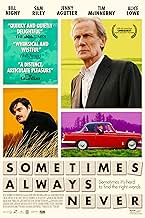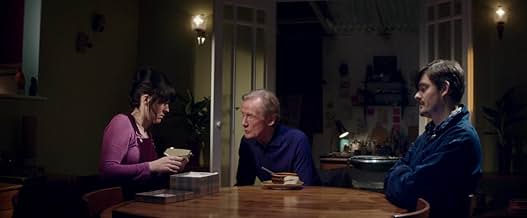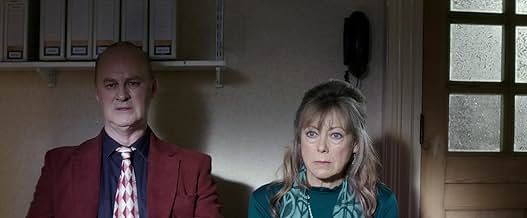VALUTAZIONE IMDb
6,3/10
3375
LA TUA VALUTAZIONE
Un dramma poliziesco in cui l'amore per le parole aiuta un padre a riconnettersi con il figlio scomparso.Un dramma poliziesco in cui l'amore per le parole aiuta un padre a riconnettersi con il figlio scomparso.Un dramma poliziesco in cui l'amore per le parole aiuta un padre a riconnettersi con il figlio scomparso.
- Regia
- Sceneggiatura
- Star
- Premi
- 1 vittoria
Trama
Lo sapevi?
- QuizThe film is based on a short story called Triple Word Score, written by the script writer Frank Cottrrel Boyce.
- BlooperWhen Alan claims that "jazz" is a high-scoring word in Scrabble, a character corrects him by stating it's impossible to play since there's only one Z tile in the set. In reality, this word is indeed playable using "wild card" tiles. If using J, A, and Z tiles and a wild card tile in place of the other Z, the word would be a high-scoring word worth a minimum of 19 points.
- ConnessioniFeatured in Projector: Sometimes Always Never (2019)
- Colonne sonoreSometimes Always Never
Written by Edwyn Collins and Sean Read
Performed by Edwyn Collins, Sean Read and Chay Heney
Recensione in evidenza
'Sometimes Always Never (2019)' is a bit of an oddity, I suppose, because of its combination of mundanity and quirkiness. It tells a grounded - though, ever-so-slightly absurdist - story with a real emotional weight to it, often with genuine subtlety but more frequently with a strange sort of passivity, and tends to toe the line between comedy and drama to the point that a distinction between the two isn't really worth making. It's not like it's particularly unfocused or haphazard, however, as it certainly feels calculated. Yet, even in its almost articulated unwillingness to conform to convention, there's a sort of intangible sense that it doesn't quite know how odd it is. It's exactly what it wants, and needs, to be. As you can tell, it's a fairly difficult experience to categorise. All in all, though, it's an enjoyable one. It has a compelling central theme and a nice set of main characters, even if the former isn't fleshed out as much as you'd like thanks to a somewhat baggy mid-section. The tone of the thing also fluctuates a little. Usually, it balances the serious with the silly, making sure that both do a decent job of developing character, but there are some moments that make you wish the movie would make its mind up as to whether or not its world is actually 'heightened' (which could be pushed further, if that is the case). It sometimes sounds overly 'written', too; this isn't necessarily a bad thing, but the sequences where you actually notice the writing pale in comparison to the ones where you don't. I'll also say that, while it's well directed overall, there are some visual stylistic choices that I don't think pay off. Of course, these issues don't prevent the flick from being generally entertaining. It's somewhat endearing, with great performances and (from what came through in the final result) a good screenplay. It's not perfect, or indeed overly satisfying, and its odd tone - or general 'status', I guess - does make it a bit difficult to get a handle on. Still, it's a good effort that nicely tells a personal, rather unique story. 6/10
- Pjtaylor-96-138044
- 14 giu 2019
- Permalink
I più visti
Accedi per valutare e creare un elenco di titoli salvati per ottenere consigli personalizzati
- How long is Sometimes Always Never?Powered by Alexa
Dettagli
- Data di uscita
- Paesi di origine
- Sito ufficiale
- Lingua
- Celebre anche come
- Triple Word Score
- Luoghi delle riprese
- Aziende produttrici
- Vedi altri crediti dell’azienda su IMDbPro
Botteghino
- Lordo Stati Uniti e Canada
- 39.191 USD
- Fine settimana di apertura Stati Uniti e Canada
- 2.599 USD
- 14 giu 2020
- Lordo in tutto il mondo
- 1.417.047 USD
- Tempo di esecuzione1 ora 31 minuti
- Colore
- Proporzioni
- 2.35 : 1
Contribuisci a questa pagina
Suggerisci una modifica o aggiungi i contenuti mancanti

Divario superiore
By what name was Sometimes Always Never (2018) officially released in India in English?
Rispondi






























